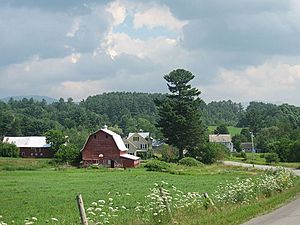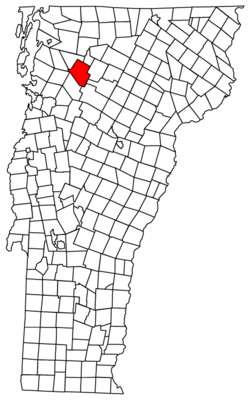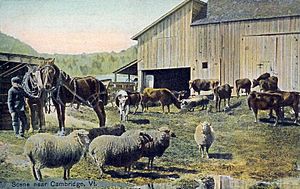Cambridge, Vermont facts for kids
Quick facts for kids
Cambridge, Vermont
|
|
|---|---|
 |
|

Cambridge, Vermont
|
|
| Country | United States |
| State | Vermont |
| County | Lamoille |
| Chartered | 1781 |
| Communities | Cambridge Cambridge Junction Jeffersonville Morses Mill North Cambridge Pleasant Valley South Cambridge |
| Area | |
| • Total | 63.69 sq mi (164.95 km2) |
| • Land | 63.19 sq mi (163.66 km2) |
| • Water | 0.50 sq mi (1.29 km2) |
| Elevation | 758 ft (231 m) |
| Population
(2020)
|
|
| • Total | 3,839 |
| • Density | 61/sq mi (23.5/km2) |
| Time zone | UTC-5 (Eastern (EST)) |
| • Summer (DST) | UTC-4 (EDT) |
| ZIP Codes | |
| Area code(s) | 802 |
| FIPS code | 50-11500 |
| GNIS feature ID | 1462063 |
Cambridge is a town located in Lamoille County, Vermont, United States. In 2020, about 3,839 people lived there. The town of Cambridge includes two smaller communities: Jeffersonville and Cambridge.
Contents
History of Cambridge, Vermont
Early Beginnings of Cambridge
Cambridge was officially created on August 13, 1781. It was given to a group of people including Samuel Robinson and John Fassett Jr. The first settlers arrived in 1783. John Safford from New Hampshire was one of the first.
The land in Cambridge had good valleys, but it was also a bit rough. It was perfect for raising farm animals. By 1839, the town had around 7,000 sheep!
Water Power and Industries
The Lamoille River flows through Cambridge. Its strong current was very useful for powering mills. These mills helped the town grow.
Early businesses included a factory that made woolen cloth. There was also a tannery, which made leather from animal hides. Gristmills ground grain into flour, and sawmills cut wood. There were even shops that made furniture.
King's College Tract and Town Names
Cambridge and a nearby town called Johnson were once part of a special area. This area was known as the King's College Tract. King George III set it aside in 1764. The idea was to build a university there one day.
The name "Cambridge" might remind you of the famous University of Cambridge in England. The town of Johnson was named after William Samuel Johnson. He was an important person at the time.
Railroads and Trails
In the past, two important railroads passed through Cambridge. These were the St. Johnsbury & Lake Champlain Railroad and the Burlington & Lamoille Railroad. Today, part of the old railroad path is now the Lamoille Valley Rail Trail. It's a great place for walking and biking.
Geography of Cambridge
Location and Rivers
Cambridge is in the western part of Lamoille County. It shares borders with Franklin County to the northwest and Chittenden County to the southwest. The town covers about 165 square kilometers (63.7 square miles). Most of this area is land, with a small amount of water.
The Lamoille River is a major river in Cambridge. It flows from east to west through the middle of the town. The villages of Jeffersonville and Cambridge are located along its northern banks.
Important Tributaries
Two smaller rivers, called tributaries, flow into the Lamoille River from the south. The Brewster River starts in Smugglers Notch. This is a mountain pass in the Green Mountains. It flows north to Jeffersonville.
The Seymour River begins in Underhill. It also flows north, reaching Cambridge village. These rivers are important for the local environment.
Major Roads and Routes
Several main roads cross through Cambridge. These include Vermont Route 15, Vermont Route 104, Vermont Route 108, and Vermont Route 109. These routes connect Cambridge to other towns and cities in Vermont.
For example, VT-15 goes southwest to Winooski (near Burlington) and southeast to Morrisville. VT-108 goes north to Enosburg Falls and south through Smugglers Notch to Stowe.
Economy in Cambridge
The biggest employer in Cambridge is Smugglers' Notch Resort. This resort is a popular place for skiing and other outdoor activities. It brings many visitors and jobs to the town.
Population and People
| Historical population | |||
|---|---|---|---|
| Census | Pop. | %± | |
| 1790 | 359 | — | |
| 1800 | 733 | 104.2% | |
| 1810 | 990 | 35.1% | |
| 1820 | 1,176 | 18.8% | |
| 1830 | 1,613 | 37.2% | |
| 1840 | 1,790 | 11.0% | |
| 1850 | 1,849 | 3.3% | |
| 1860 | 1,784 | −3.5% | |
| 1870 | 1,651 | −7.5% | |
| 1880 | 1,750 | 6.0% | |
| 1890 | 1,689 | −3.5% | |
| 1900 | 1,606 | −4.9% | |
| 1910 | 1,696 | 5.6% | |
| 1920 | 1,593 | −6.1% | |
| 1930 | 1,402 | −12.0% | |
| 1940 | 1,383 | −1.4% | |
| 1950 | 1,435 | 3.8% | |
| 1960 | 1,295 | −9.8% | |
| 1970 | 1,528 | 18.0% | |
| 1980 | 2,019 | 32.1% | |
| 1990 | 2,667 | 32.1% | |
| 2000 | 3,186 | 19.5% | |
| 2010 | 3,659 | 14.8% | |
| 2020 | 3,839 | 4.9% | |
| U.S. Decennial Census | |||
In 2020, the population of Cambridge was 3,839 people. The town has grown quite a bit over the years. In 2000, there were 3,186 people living there.
The average age in Cambridge in 2000 was 36 years old. About 24.4% of the population was under 18 years old. This means many families with children live in the town.
Places to Visit in Cambridge
Cambridge has several interesting places to see:
- Cambridge Junction Covered Bridge
- Gates Farm Covered Bridge
- Lamoille Valley Rail Trail
- Scott Covered Bridge
- Smugglers Notch
- Smugglers' Notch Resort
- Smugglers' Notch State Park
Notable People from Cambridge
Many interesting people have connections to Cambridge:
- John Fassett Jr. – He was a justice on the Vermont Supreme Court from 1778 to 1786.
- Bernie Juskiewicz – He served as a Vermont state representative and was a businessman.
- Anson D. Morse – An educator and historian.
- Lucy Wheelock – She was an educator and founded Wheelock College.
- William C. Wilson – He was also a justice of the Vermont Supreme Court.
See also
 In Spanish: Cambridge (Vermont) para niños
In Spanish: Cambridge (Vermont) para niños
 | Aurelia Browder |
 | Nannie Helen Burroughs |
 | Michelle Alexander |



